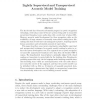177 search results - page 24 / 36 » Reasoning about Safety and Progress Using Contracts |
108
Voted
AAAI
1994
15 years 3 months ago
1994
In this paper, we study the problem of achieving efficient interaction in a distributed scheduling system whose scheduling agents may borrow resources from one another. Specifical...
153
click to vote
ATAL
2007
Springer
15 years 8 months ago
2007
Springer
This paper proposes a framework for agent-based distributed machine learning and data mining based on (i) the exchange of meta-level descriptions of individual learning processes ...
135
click to vote
CSL
2002
Springer
15 years 1 months ago
2002
Springer
The last decade has witnessed substantial progress in speech recognition technology, with todays state-of-the-art systems being able to transcribe unrestricted broadcast news audi...
129
click to vote
ICSE
2007
IEEE-ACM
16 years 2 months ago
2007
IEEE-ACM
Synthesis of behaviour models from software development artifacts such as scenario-based descriptions or requirements specifications not only helps significantly reduce the effort...
109
click to vote
ISSRE
2002
IEEE
15 years 6 months ago
2002
IEEE
Software Fault Tree Analysis (SFTA) provides a structured way to reason about the safety or reliability of a software system. As such, SFTA is widely used in missioncritical appli...


